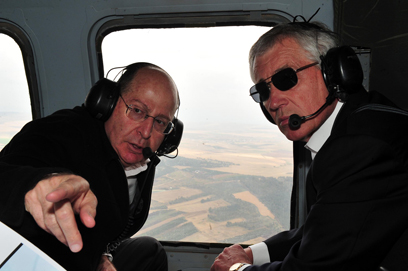
Hagel: US-Arab relations benefit Israel
Speaking at Washington Institute for Near East Policy, defense secretary says Israel's security further enhanced by America's defense cooperation with Arab nations. On Iran: No option off the table
WASHINGTON – "Iran's support for the Assad regime and Lebanese Hezbollah, its destabilizing activities in the Persian Gulf, and its nuclear ambitions pose a clear threat to the United States, Israel, the nations of the Gulf Cooperation Council, and the wider world," US Defense Secretary Chuck Hagel said Thursday.
Speaking to the Washington Institute for Near East Policy's annual Soref Symposium, Hagel said President Barack Obama "has been clear that America's national security interests in the Middle East include the security of Israel, supporting our allies, fighting terrorism, preventing Iran from obtaining a nuclear weapon, pursuing Middle East peace, playing a stabilizing role with our regional partners, and working to support democratic transitions in Yemen, North Africa, and ultimately in Syria."
Related stories:
- Op-ed: Obama's revenge
- Hagel: Israel, US see 'exactly same' Iran threat
- US: Hagel nomination irks pro-Israel conservatives
The Pentagon chief said Israel is America’s "closest friend and ally in the Middle East," adding that during a series of meetings in Tel Aviv and Jerusalem with a Defense Minister Moshe Ya'alon, President Shimon Peres and Prime Minister Benjamin Netanyahu, "I conveyed our continued commitment to enhancing defense cooperation – which has reached unprecedented levels in recent years.
"One of the core principles of US-Israel security cooperation is America's commitment to maintain Israel’s qualitative military edge – its capacity to defeat any threat or combination of threats from state or non-state actors. As I emphasized during the trip, Israel is a sovereign nation and has the right to defend itself," Hagel told the conference.
"The Department of Defense works closely with the (Israeli) Ministry of Defense to develop and field the versatile range of advanced capabilities Israel needs to defend its people and its interests. One current example, among many, is our close cooperation on rocket and missile defense efforts – including Iron Dome, Arrow, and David’s Sling."

Ya'alon (L) and Hagel fly over Golan Heights last month (Photo: Ariel Hermoni)
According to the US defense secretary, Israel's security is further enhanced by America’s defense cooperation with other regional allies. In my consultations with Israeli leadership, I emphasized that strong US security relationships with Arab nations – including Egypt and Jordan, and our partners in the Gulf – are not only in our strategic interests, they are also in Israel’s security interests.
Amid increased pressure on the US to intervene in the Syrian civil war following reports of the use of chemical weapons, Hagel said the US will continue to work toward achieving "our goal of ending the violence and helping the Syrian people transition to a post-Assad authority. This will help restore stability, peace, and hope for all Syrian people. That goal is shared by our allies in the region – not only those bordering Syria, but also our partners in the Gulf.
Addressing the Iranian nuclear threat, the Pentagon chief said the US will continue to lead diplomatic efforts and international economic sanctions to "pressure Iran into abandoning the pursuit of a nuclear weapon, and meeting their international obligations. There is a presidential election next month in Iran, and no one can predict with certainty if that might affect the future direction of Iranian policies. As you all know, President Obama has made clear that our policy is to prevent Iran from obtaining a nuclear weapon, and he has taken no option off the table to ensure that outcome. I stressed that point during my discussions in the Gulf.
"A key element of our efforts to counter Iranian threats is building a cooperative defense network – raising the military capabilities of our partners in the Gulf who share our commitment to regional security and our concerns about Iran and violent extremism on the Arabian Peninsula," the defense secretary said in his speech.
"Each nation in the region is different, and facing different combinations of threats. But these are regional challenges I’ve described tonight – whether the nuclear challenge posed by Iran, dangerous instability in Syria, or the continuing threat of al-Qaeda and other terrorist groups. These common challenges must be met through the force of coalitions of common interests, which include Israel and our other allies in the region."
Referring to his recent trip to Israel, Hagel said: "More than 45 years after I first learned about the Gaza Strip, Golan Heights, and West Bank as a young Army recruit, I found myself surveying this terrain aboard an IDF helicopter alongside another old soldier – Israeli Minister of Defense Ya'alon. As we toured the region, I thought about what is possible if these democratic transitions in the Middle East can succeed, and if a sustainable and comprehensive peace between Israel and the Palestinians is ultimately achieved.
"The old order in the Middle East is disappearing, and what will replace it remains unknown. There will continue to be instability in the region as this process plays out, and we all must adjust accordingly. The best hope for long-term stability relies on countries like Egypt, Libya, and Syria making transitions to democratic rule. These transitions need to be supported by institutions and legal frameworks that respect the life, liberties and property of all their citizens," the defense told the conference.
- Receive Ynetnews updates directly to your desktop










